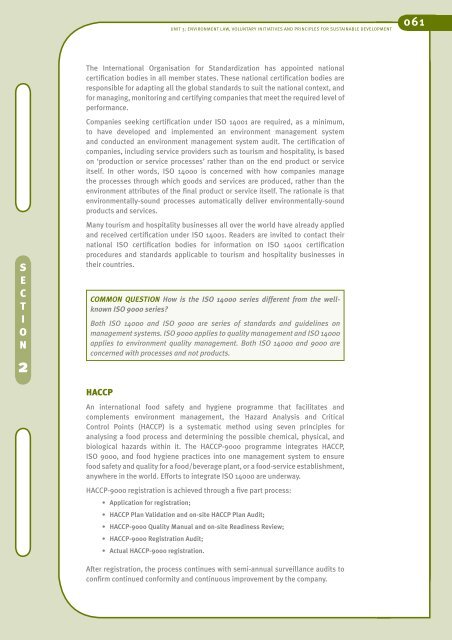Online version: PDF - DTIE
Online version: PDF - DTIE
Online version: PDF - DTIE
Create successful ePaper yourself
Turn your PDF publications into a flip-book with our unique Google optimized e-Paper software.
UNIT 3: ENVIRONMENT LAW, VOLUNTARY INITIATIVES AND PRINCIPLES FOR SUSTAINABLE DEVELOPMENT<br />
061<br />
The International Organisation for Standardization has appointed national<br />
certification bodies in all member states. These national certification bodies are<br />
responsible for adapting all the global standards to suit the national context, and<br />
for managing, monitoring and certifying companies that meet the required level of<br />
performance.<br />
Companies seeking certification under ISO 14001 are required, as a minimum,<br />
to have developed and implemented an environment management system<br />
and conducted an environment management system audit. The certification of<br />
companies, including service providers such as tourism and hospitality, is based<br />
on ‘production or service processes’ rather than on the end product or service<br />
itself. In other words, ISO 14000 is concerned with how companies manage<br />
the processes through which goods and services are produced, rather than the<br />
environment attributes of the final product or service itself. The rationale is that<br />
environmentally-sound processes automatically deliver environmentally-sound<br />
products and services.<br />
S<br />
E<br />
C<br />
T<br />
I<br />
O<br />
N<br />
2<br />
Many tourism and hospitality businesses all over the world have already applied<br />
and received certification under ISO 14001. Readers are invited to contact their<br />
national ISO certification bodies for information on ISO 14001 certification<br />
procedures and standards applicable to tourism and hospitality businesses in<br />
their countries.<br />
COMMON QUESTION How is the ISO 14000 series different from the wellknown<br />
ISO 9000 series?<br />
Both ISO 14000 and ISO 9000 are series of standards and guidelines on<br />
management systems. ISO 9000 applies to quality management and ISO 14000<br />
applies to environment quality management. Both ISO 14000 and 9000 are<br />
concerned with processes and not products.<br />
HACCP<br />
An international food safety and hygiene programme that facilitates and<br />
complements environment management, the Hazard Analysis and Critical<br />
Control Points (HACCP) is a systematic method using seven principles for<br />
analysing a food process and determining the possible chemical, physical, and<br />
biological hazards within it. The HACCP-9000 programme integrates HACCP,<br />
ISO 9000, and food hygiene practices into one management system to ensure<br />
food safety and quality for a food/beverage plant, or a food-service establishment,<br />
anywhere in the world. Efforts to integrate ISO 14000 are underway.<br />
HACCP-9000 registration is achieved through a five part process:<br />
• Application for registration;<br />
• HACCP Plan Validation and on-site HACCP Plan Audit;<br />
• HACCP-9000 Quality Manual and on-site Readiness Review;<br />
• HACCP-9000 Registration Audit;<br />
• Actual HACCP-9000 registration.<br />
After registration, the process continues with semi-annual surveillance audits to<br />
confirm continued conformity and continuous improvement by the company.
















